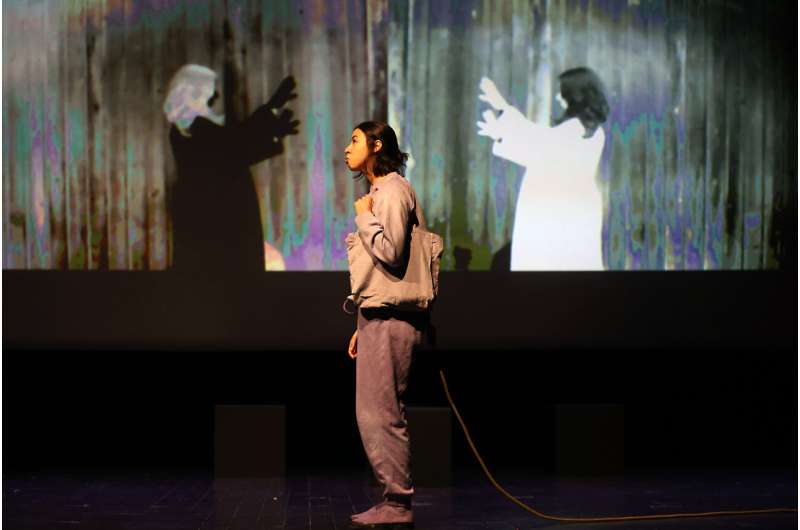Science
Portuguese Theater Tackles Bipolar Disorder Through Performance

A Portuguese theater company is using the stage to address the stigma surrounding bipolar disorder and to promote public understanding of mental health. The play, titled Oxímoro, entre Solstícios e Equinócios (Oxymoron, Between Solstices and Equinoxes), was developed by Marionet, a company known for integrating scientific research into its performances. The theatrical production was created in collaboration with experts, including doctors, researchers, and patients, to ensure an accurate and sensitive portrayal of bipolar disorder.
The play is part of a broader initiative to educate audiences about mental health issues. In a promotional trailer on YouTube, a speaker highlights the misconceptions surrounding bipolar disorder, noting how people often trivialize mood swings by joking about being “a bit bipolar.” This reinforces the need for accurate information to combat such stereotypes.
Collaboration and Emotional Engagement
The project involved extensive collaboration with the Center for Neuroscience and Cell Biology at the Universidade de Coimbra and health practitioners from the Integrated Psychiatry Responsibility Center of the Coimbra Hospital and University Center. The creative process began with interviews of patients, doctors, and family members, allowing the team to capture authentic experiences related to bipolar disorder.
Mário Montenegro, a representative of Marionet, emphasized the importance of informed storytelling. “We felt the need to change our creative process, because these were delicate subjects that touched people’s lives,” he explained. The resulting script is composed of various scenes featuring different characters, moving away from a single narrative to reflect the complexity of the disorder.
The play was performed at the BlackBox of Convento São Francisco in Coimbra from March 20 to 24, 2024, with a total of six performances. After each show, audience members were invited to provide feedback through questionnaires.
Impact on Audience Perception
Of the approximately 300 attendees, 54 completed the questionnaires, which revealed that emotional engagement was a significant factor in how audiences processed and retained information about bipolar disorder. Montenegro noted that the strong emotional responses helped humanize the illness, moving beyond mere statistics to foster empathy and understanding.
According to the analysis published in the Journal of Science Communication, emotional resonance facilitated the assimilation of scientific information and contributed to reducing stigma associated with mental health issues. The authors concluded that emotions, when thoughtfully integrated into performances, can enhance the communication of complex subjects.
The play’s approach aligns with a growing recognition of the role of emotions in science communication. As Luisa Massarani, a researcher at the Brazilian Institute of Public Communication of Science and Technology, stated, “Theater is indeed a very powerful way for engaging people in science and health issues.”
Montenegro’s aim was to leave interpretations open, allowing audiences to form their own opinions and react based on their individual experiences. He believes that this method not only promotes understanding but also encourages a more personal connection to the material presented.
The findings of this initiative underscore the potential of theater as a medium for addressing serious health topics. By fostering emotional engagement, productions like Oxímoro can contribute significantly to public discourse around mental health and the reduction of stigma associated with disorders like bipolar disorder.
For those interested in further research on this topic, the paper titled “Theatre and bipolar disorder: dealing with emotions” by Montenegro, Silvia Carballo, and Francisca Moreira is available in the special issue focused on emotions and science communication.
-

 Health2 weeks ago
Health2 weeks agoInnovative Surgery Restores Confidence for Breast Cancer Patients
-

 Top Stories2 weeks ago
Top Stories2 weeks agoMarc Buoniconti’s Legacy: 40 Years Later, Lives Transformed
-

 Sports4 weeks ago
Sports4 weeks agoSteve Kerr Supports Jonathan Kuminga After Ejection in Preseason Game
-

 Science4 weeks ago
Science4 weeks agoChicago’s Viral ‘Rat Hole’ Likely Created by Squirrel, Study Reveals
-

 Entertainment4 weeks ago
Entertainment4 weeks agoZoe Saldana Advocates for James Cameron’s Avatar Documentary
-

 Politics4 weeks ago
Politics4 weeks agoDallin H. Oaks Assumes Leadership of Latter-day Saints Church
-

 Lifestyle4 weeks ago
Lifestyle4 weeks agoKelsea Ballerini Launches ‘Burn the Baggage’ Candle with Ranger Station
-

 Business4 weeks ago
Business4 weeks agoTyler Technologies Set to Reveal Q3 2025 Earnings on October 22
-

 Top Stories2 weeks ago
Top Stories2 weeks agoBOYNEXTDOOR’s Jaehyun Faces Backlash Amid BTS-TWICE Controversy
-

 Business3 weeks ago
Business3 weeks agoZacks Research Downgrades Equinox Gold to Strong Sell Rating
-

 Health3 weeks ago
Health3 weeks ago13-Year-Old Hospitalized After Swallowing 100 Magnets
-

 Business3 weeks ago
Business3 weeks agoBusiness Schools Urged to Prioritize Economic Freedom Education









